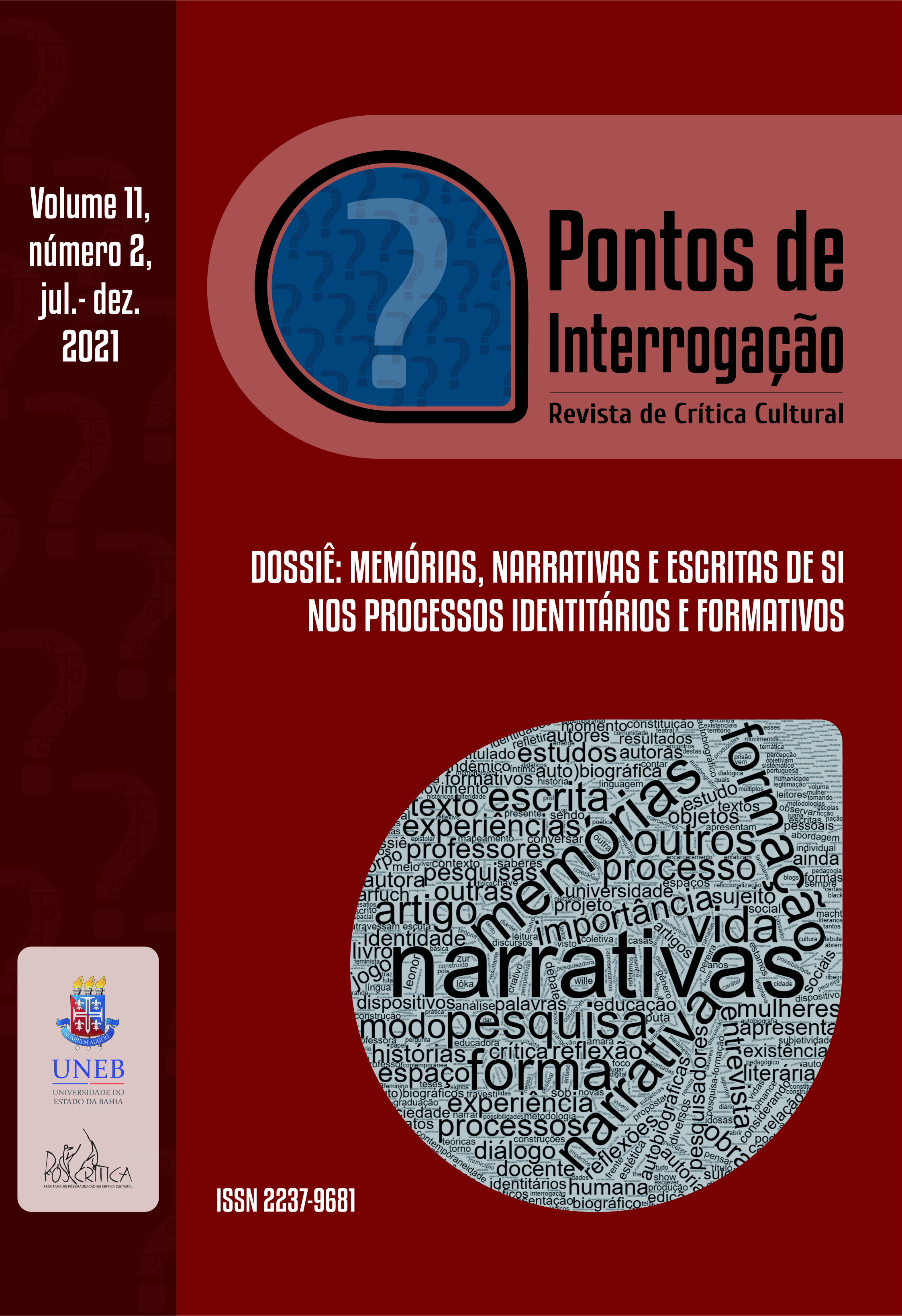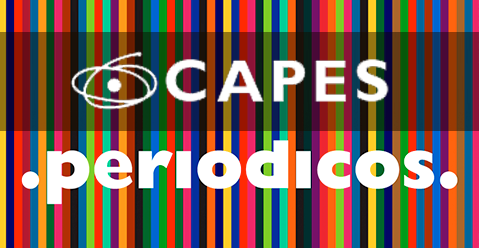An artificial record of contemporary memory
the Blogs
DOI:
https://doi.org/10.30620/pdi.v11n2.p205Keywords:
Memory, Female authorship, Blogs, Ângela VilmaAbstract
The theme “memory” has been the object of research in several areas of study in recent times. Areas ranging from the field of health to the field of culture. It is possible to see how this theme generates possibilities. From the 20th century onwards, the paper support was gradually replaced by the computer screen, which expanded the individual's ability to gather memories in an external apparatus, at the same time that it made possible the gradual lag of the human physiological capacity to remember. It is in this technological scenario that we seek to investigate the new paths woven by the individual memory of those who toil with the craft of writing. With new technologies, writers began to produce their texts in a circuit of authorship, publication and reception different from previous centuries, due to the use of new tools such as the blog. The purpose of this text is to discuss the extent to which blogs can be a new way of archiving personal and collective memory, especially when texts written under the bias of a female authorship are linked to this situation. The combination of individual memory with the strength of literary memory, therefore collective, activates a power in the blog Aeronauta by Bahian writer Ângela Vilma. Thus, the discussion undertaken in this text considers memory as a process that is in constant transformation due to historical and/or social factors and that can be both in the individual and collective fields. This work was developed based on the considerations made by Maurice Halbwachs (1990), Denise Schittine (2004), Luiza Lobo (2007), Lúcia Santaella (2011), Philippe Lejeune (2014), among others. Therefore, this study proves to be relevant, because it will shed light on urgent issues in the 21st century, which are: a look at the current literature produced by women in Bahia, a study on blog support and its legitimacy within the academic universe.
[Received on: July 29, 2021 - Accepted on: October 30, 2021]
Downloads
References
ALVES, Lourdes Kaminski; COSTA, José Carlos da. Representações da memória na literatura e na cultura. Revista Investigações, Pernambuco, v. 23, n. 1, p. 187-210, jan. 2010.
BARROS, José D’Assunção. História e memória: uma relação na confluência entre tempo e espaço. Mouseion, Canoas/RS, vol. 3, n.5, jan-jul. 2009. Disponível em: http://www.revistas.unilasalle.edu.br/documentos/Mouseion/Vol5/historia_memoria.pdf. Acesso em: 6 out. 2013.
HABERMAS, Jürgen. Mudança estrutural da esfera pública: investigações quanto a uma categoria da sociedade burguesa. Trad. de Flávio R. Kothe. Rio de Janeiro: Tempo Brasileiro, 1984.
HALBWACHS, Maurice. A memória coletiva. Trad. Laurent Léon Schaffter. São Paulo: Edições vértice. 1990. Disponível em: http://minhateca.com.br/revistaperspectivahistorica/A+Mem*c3*b3ria+Coletiva-+Maurice+Halbwachs,46380547.pdf. Acesso em: 24 abr.2015.
KOFES, Suely; PISCITELLI, Adriana. Memórias de Histórias Femininas, memórias e experiências. Cadernos Pagu. Campinas, vol. 8/9, p. 343-354, 1997.
KOMESU, Fabiana. Blogs e as práticas de escrita sobre si na internet. In: MARCUSCHI, Luiz Antonio; XAVIER, Antonio Carlos. (Org.). Hipertexto e gêneros digitais: novas formas de construção do sentido. Rio de Janeiro: Lucerna, 2004. p. 110-119.
LEJEUNE, Philippe. O pacto autobiográfico: de Rousseau à internet. Trad. Jovita Maria Gerheim Noronha, Maria Inês Coimbra Guedes. 2ed. Belo Horizonte: UFMG, 2014.
LOBO, Luiza. Segredos públicos: os blogs de mulheres no Brasil. Rio de Janeiro: Rocco, 2007. (Ideias contemporâneas).
NORA, Pierre. Entre memória e história: a problemática dos lugares. Projeto História, São Paulo, n.10, p. 7-28, dez. 1993. Disponível em: http://revistas.pucsp.br/index.php/revph/article/viewFile/12101/8763. Acesso: 27 abr. 2014.
PERROT, Michelle. Práticas da memória feminina. Revista Brasileira de História. São Paulo, v. 9, n. 18, p. 10-18. ago./set. 1989.
PROUST, Marcel. Em busca do tempo perdido no caminho de Swann-Combray. Trad. Fernando Py. 1992, vol. 1. Disponível em: https://projetophronesis.files.wordpress.com/2012/06/proust-em-busca-dotempo-perdido-1-no-caminho-de-swann.pdf. Acesso em: 29 mai.2015.
RESENDE, Beatriz. Contemporâneos: expressões da literatura brasileira contemporânea do século XXI. Rio de Janeiro: Casa da Palavra: Biblioteca Nacional, 2008.
SBARAI, Rafael. Facebook alcança marca de 76 milhões de usuários no brasil. Veja.com. Disponível em: http://veja.abril.com.br/noticia/vidadigital/facebook-alcanca-marca-de-76-milhoes-de-usuarios-no-brasil. Acesso em: 6 jul. 2015.
SCHITTINE, Denise. Blog: comunicação e escrita íntima na internet. Rio de Janeiro: Civilização Brasileira, 2004.
SCHOLLHAMMER, Karl Erik. Ficção brasileira contemporânea. Rio de Janeiro: Civilização Brasileira, 2009.-(Coleção contemporânea: Filosofia, literatura e artes).
SOARES, Angélica. Transparências da memória estórias de opressão: diálogos com a poesia brasileira contemporânea de autoria feminina. Florianópolis: Editora Mulheres, 2009.
VILMA, Ângela. Blog: Aeronauta. Disponível em: http://wwwaeronauta.blogspot.com. Acesso em: 10 jun. 2011.
VILMA, Ângela. Currículo Lattes. Disponível em: http://buscatextual.cnpq.br/buscatextual/visualizacv.do?id=K4238280T0. Acesso em: 10 jul. 2015.
Published
How to Cite
Issue
Section
License
Copyright (c) 2021 Pontos de Interrogação – Journal of Cultural Criticism

This work is licensed under a Creative Commons Attribution-ShareAlike 4.0 International License.
Autores que publicam nesta revista concordam com o seguinte termo de compromisso:
Assumindo a criação original do texto proposto, declaro conceder à Pontos de Interrogação o direito de primeira publicação, licenciando-o sob a Creative Commons Attribution License, e permitindo sua reprodução em indexadores de conteúdo, bibliotecas virtuais e similares. Em contrapartida, disponho de autorização da revista para assumir contratos adicionais para distribuição não-exclusiva da versão do trabalho publicada, bem como permissão para publicar e distribuí-lo em repositórios ou páginas pessoais após o processo editorial, aumentando, com isso, seu impacto e citação.























